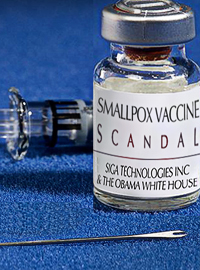| Siga Smallpox Contract Is the Next Solyndra Scandal |
 |
|
By Ashton Ellis
Tuesday, November 15 2011 |
If the Solyndra scandal failed to convince some people that President Barack Obama’s promise to “restore science to its rightful place” above political considerations has no basis in reality, a new taxpayer-funded boondoggle involving yet another corrupt government contract proves it. Details are rapidly emerging that Siga Technologies Inc., a little-known pharmaceutical company with deep ties to the Obama White House, is using its political connections to secure a $433 million contract that violates federal procurement procedure and scientific integrity. On November 13, the Los Angeles Times reported that Siga, the manufacturer of a controversial pill that allegedly cures smallpox, is in the process of securing a no-bid contract that would guarantee the company a 180 percent windfall profit. Negotiators for the federal government appear ready to capitulate, but only after Obama officials stacked the deck against outside competition. A look at how Siga maneuvered into this position speaks volumes about how far the administration is willing to go to reward friends at the expense of American taxpayers. After the September 11 attacks heightened Washington’s interest in bio-defense, several firms tried to anticipate how to make money from federal programs requiring the government to stockpile antidotes to various contagious diseases. Siga created a pill to cure smallpox, but the drug suffers from several drawbacks. To start, the federal government already has vast stockpiles of smallpox vaccines. These shots are known to work because they derive from the line of inoculations used to eradicate smallpox as a disease worldwide in the early 1970s. According to the Times, the $1 billion worth of vaccine housed in government facilities costs $3 a dose, and is sufficient to cure any American infected within four days of contracting smallpox. Theoretically, Siga’s pill would cure anyone infected after the four-day window, but therein lies one of many problems. Smallpox exists only in locked freezers controlled by the United States and Russian governments, and medical ethics do not allow researchers to infect humans to test the effectiveness of Siga’s drug. In the language of venture capitalism, Siga can’t prove its concept works. Not that a private sector mindset is guiding Siga’s backers. From the start, the company knew that its one and only client would be the United States government, so it took advantage of every possible means to make taxpayers pay for its services. Throughout its development of the smallpox pill, Siga sought and received numerous federal research grants. One estimate puts total federal R&D assistance at $115 million – an amount completely separate from the $433 million price tag demanded by Siga in its current negotiations with the government. Using the latter figure, Siga’s cost per dose would be $255. Siga confirmed that price to the Times. Oh, and did I mention that whereas the government’s smallpox vaccine lasts for decades, Siga’s pill is only good for 38 months? One would think that with all the problems facing Siga’s controversial, overpriced and unproven drug its directors would be happy to get any deal from a buyer that funded the work, but doesn’t need the product. But rather than cut their losses, Siga’s investors are calling in favors. Eric Rose, Siga’s CEO, complained to a politically appointed administrator at the Department of Health and Human Services about the lead HHS negotiator’s “approach to profit.” Rather than second the negotiator’s view that a three digit profit is outrageous, the administrator tried to soothe Rose’s complaints by replacing the negotiator. When the Small Business Administration said Siga was too big to be awarded the smallpox contract, HHS gave the contract no-bid status, freezing out at least one qualifying competitor. The switch also gave Siga increased leverage since HHS helped it to corner the market. If you’re looking for the motivation behind all these machinations, just remember the following names. Ronald O. Perelman is Siga’s biggest investor and one of the largest donors to Obama’s campaign. In the 2008 election cycle, Perelman donated nearly $500,000 to Democratic candidates, including Obama, and chipped in another $50,000 toward the president’s inauguration expenses. The other Siga official likely applying pressure is former Service Employee International Union (SEIU) president Andrew Stern, now a board member of the drug company. How does a career activist whose minions include low-level hotel and hospital workers get a seat on a New York-based pharmaceutical firm? Politics, baby. As head of SEIU, Stern’s 22 visits to the White House were the most of any other private figure in the first year of the Obama Administration. Now, apparently he’s figured out how to exert influence on behalf of his newest clients. Siga, like Solyndra before it, has all the stench of a corrupt bargain for a questionable product. With these two unnecessary, wasteful abuses of taxpayer money adding $1 billion to the federal deficit with nothing to show for them, Americans simply can’t afford to keep this president and his friends in office. Congress should issue subpoenas for information and immediately start freezing appropriations. If taxpayers can’t trust the executive branch to spend their money honestly, neither should their elected representatives. |
Related Articles : |
























